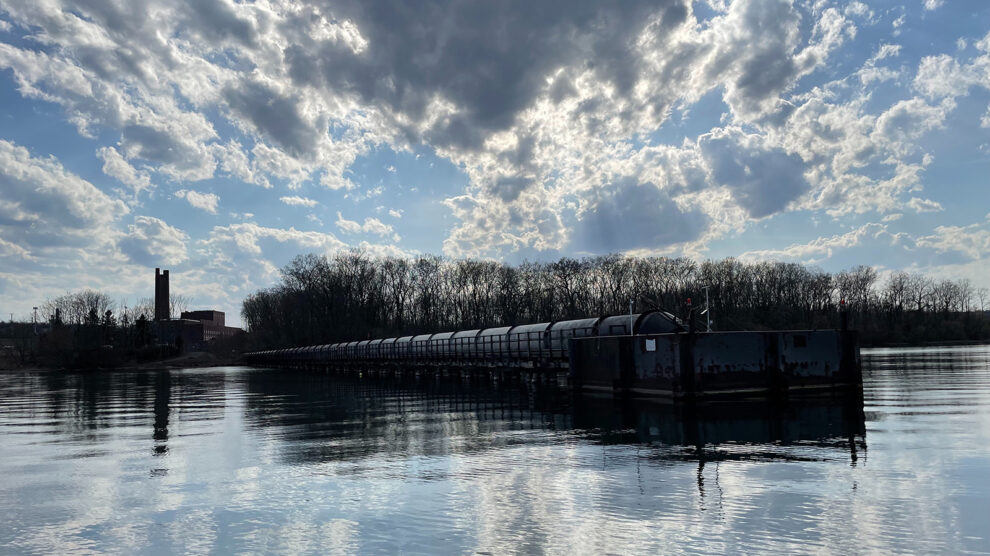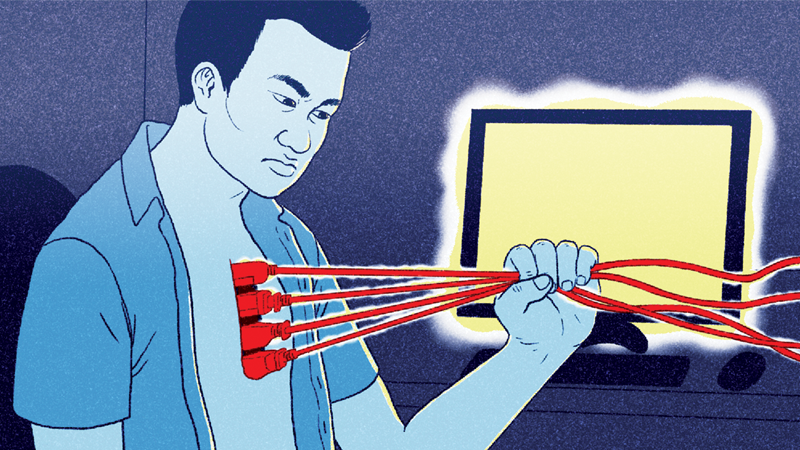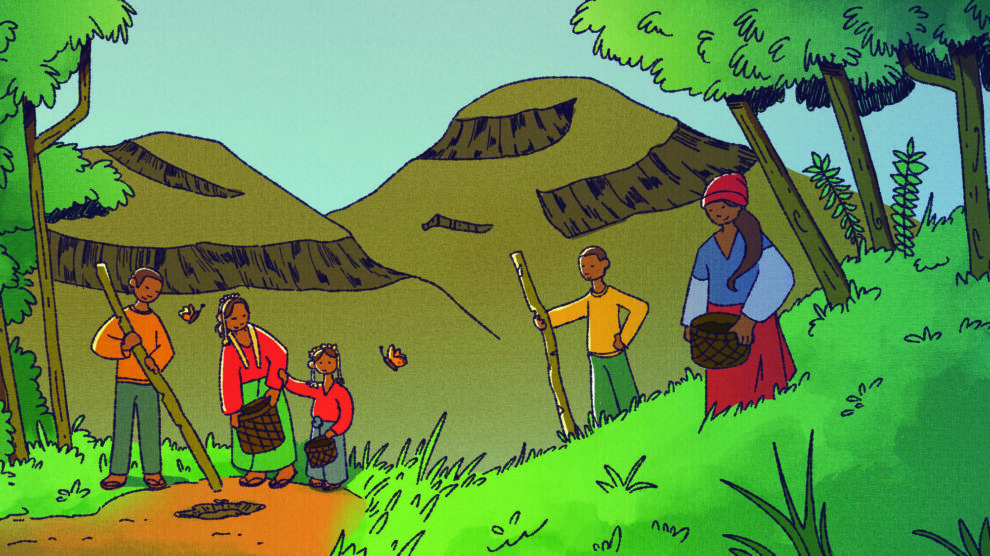Chapter and Working Group Reports, Spring 2020
Reports from Science for the People working groups and chapters
Scientists for Palestine, SftP POC Caucus, Accessibility Team, Militarism Working Group, Santa Cruz Chapter, Science for Puerto Rico
Volume 23, number 1, Science Under Occupation
Science Against All the Odds: Scientists for Palestine Holds Its Third International Conference
By Hubert Murray
Scientists for Palestine (S4P) held its third international conference on January 10-12, 2020 at the Massachusetts Institute of Technology in Cambridge, Massachusetts. In front of an audience of about 200, there were thirty Palestinian scientist presenters and panel participants, nine of whom had made the journey from Palestine.
Most notable was the absence of participants from Gaza who had been denied travel visas. Ubai Aboudi, Director of the Bisan Center for Research and Development and one of the organizers of the S4P conference, was arrested without charge in November. Aboudi is a US citizen based in Ramallah and a leading and respected educationalist. His wife, Hind Aboudi, informed us by video that his detention had just been renewed for another 101 days. In the final plenary session, the conference supported the motion that S4P should make public representations on behalf of Dr. Aboudi.
The inspiring keynote address, “Opening a New Window to the Universe” by astrophysicist Nergis Mavalvala, was followed by a panel discussion outlining the issues facing Palestinian scientists under Israeli occupation. Whether they are situated in the West Bank and Gaza, in 1948 Palestine, in the refugee camps of Lebanon and Syria, or in the wider diaspora, Palestinian scientists face significant barriers to collaborative research, including closures, checkpoints, travel restrictions, scarcity of material resources, interruptions to water and electricity supplies, and paucity of research funding. Marwan Awartani, a mathematician and now Minister for Education and Higher Education, stressed that these obstacles were directly antithetical to the idea of the university as a site of multidisciplinary free exchange of ideas.
Prevailing against the impediments imposed by the Israeli state, S4P promulgates the humanistic universality of scientific and technological research. Scientific leaders representing eight of the seventeen Palestinian universities demonstrated a wide range of high-level theoretical work from entomology to high energy physics, cancer research, genomic research, and emergency medicine.
Dr. Yousef Najajreh from Al-Quds University presented his cancer research projects. Dr. Reham Khalaf-Nazzal from Arab American University in Jenin discussed her research on rare genomic diseases including microcephaly. Dr. Tarek Loubani, a Canadian doctor working in Gaza, through his Glia Project, uses 3D printing to manufacture affordable stethoscopes, needle drivers, and tourniquets.
On Sunday the sessions broke up into working groups to focus on institution building, each tasked with developing an agenda for its subject area and a mechanism for advancing knowledge and international cooperation.
The problem of “translation” in science, making the transition from theoretical or laboratory work to implementation and application, is exacerbated in Occupied Palestine. There, due to physical and intellectual obstructions confronting Palestinian academics and practitioners, an additional transition must be made: the translation of scientific research and technology from Palestine to the wider world.
Despite the restrictions they endure, Palestinian scientists muster a corresponding ingenuity in surmounting obstacles. Within a generation, the whole world will be suffering from the privations of climate change and resource depletion. Palestine, and Palestinian scientists, show us how to prevail, despite the odds.
An earlier version of this post first appeared on the website of the Alliance for Water Justice in Palestine.
To learn more about Scientists for Palestine, visit scientists4palestine.com.
Join the SftP POC Caucus!
By Lisette Torres-Gerald
Science for the People prides itself on being a radical science organization committed to anti-oppression. We welcome all cultural, educational, and socioeconomic backgrounds and abilities. However, our organization is still homogeneous and has yet to fully speak to the questions and concerns of marginalized communities of color.
If you or someone you know is a scientist of color who has issues you want to see amplified and demands that the needs of your communities be heard, then join the People of Color (POC) Caucus! Email us with your name, email, geographic location, disciplinary specialty, and a topic of concern that you would like to help the caucus spearhead.
Contact: SftPPOCCaucus@gmail.com
Join the Accessibility Team for SftP Magazine!
By Lisette Torres-Gerald
Science for the People magazine is dedicated to making our materials accessible to all readers. Acknowledging that we live in an ableist society and that many of us are unfamiliar with disability justice, we aim to educate ourselves and others on how to make writing about science and social justice accessible to people of all abilities and cultural backgrounds.
As such, we have created an Accessibility Team on our Publications Committee to ensure that the SftP website, magazine, and all online content follow WCAG 2.0 and W3C Accessibility Standards. We also want to learn and educate other members about assistive technology, user/reader needs, accessibility standards, and design principles. Lastly, we will develop and maintain accessibility resources for the magazine.
If you are interested in accessibility issues, disability studies, and disability justice, our team may be for you! To join the Accessibility Team, email us with your name, email, geographic location, and how experienced you are with accessibility.
Contact: SftPAccessibilityTeam@gmail.com
Militarism Working Group Report
By Michael Gasser
The Militarism Working Group of Science for the People is committed to:
- educating scientists and university students about the role that science and technology play in US imperialism and the militarization of US society
- providing resources to students and faculty that help them uncover the extent of the military presence on their campuses
- fighting for the abolition of nuclear, chemical, and biological weapons and for the immediate cessation of funding for research on these weapons
- opposing military recruitment in US middle and high schools
- organizing in solidarity with tech workers who oppose their companies’ collaboration with the military, DHS, and intelligence agencies
Currently, our main project focuses on counter-recruitment at university job fairs. We are planning actions at Northwestern University, the University of Illinois at Urbana-Champaign, and the University of California, Santa Cruz in early 2020. In preparation, we are developing a scheme for evaluating the ways in which, and the degree to which, companies are involved with the Pentagon and the Department of Homeland Security.
We meet on a conference call the first Sunday of each month at 5 p.m. Eastern time zone.
Contact: sftp.militarism@gmail.com
SftP Santa Cruz Chapter Report
By Michael Gasser
The Santa Cruz (CA) chapter of SftP came together in October of 2019, building on local organizing around the Global Climate Strike in September and on current and past activism among members of the agroecology research community in and around the University of California, Santa Cruz (UCSC). Our growing membership is composed of recent graduates and current graduate students from UCSC and a handful of community members with backgrounds in natural and social sciences and political activism. As a newly formed chapter, we have been working in coalition with other activist groups to build our power, share our message, and increase our ranks. So far, our chapter has focused on climate change, settler colonialism, and counter-recruiting at job fairs.
The Santa Cruz Climate Strike Coalition consists of twelve local activist groups and nonprofits. These groups came together with students of all ages to organize a county-wide educational kick-off event and a week of actions that culminated in a general climate strike in Santa Cruz. SftP members, as well as the local Democratic Socialists of America chapter, played an important role in the coalition by focusing attention on the banks and big-tech firms that have offices in Santa Cruz—we came to call them “avatars of climate chaos.” The new Santa Cruz chapter of SftP remains active in the coalition that is beginning discussions around a People’s Green New Deal for Santa Cruz County.
The central topic of our first several meetings was the proposed Thirty Meter Telescope (TMT) atop Mauna Kea, the most sacred mountain in Hawaii. After shared reading and discussion on the history and current state of struggle in Hawaii, we worked with the UCSC Mauna Kea Protectors to organize an event at UCSC. Several Native Hawaiian elders and cultural practitioners came to share their stories and demand that the University of California withdraw its support for the TMT. It was a powerful event that drew over three hundred people from the campus and the broader community.
Our current project is focused on counter-recruiting at UCSC job fairs, in collaboration with SftP’s Militarism Working Group. Close to the heart of Silicon Valley and with a Lockheed Martin facility just a couple of miles away, UCSC is a natural target for recruiters from Big Tech companies that are collaborating with the Pentagon and the Department of Homeland Security. This makes counter-recruiting at UCSC extremely important. We are currently doing research, writing up literature, and developing a strategy around winter job fairs on campus.
Contact: sftp.santacruz@gmail.com
Science for Puerto Rico Report
By David Hofmann
Five decades ago, Science for the People (Vol. 6, no. 2, March 1974) reported that the UN General Assembly “approved a committee report declaring that Puerto Rico was in fact a colony of the United States, not an independent country.” And it noted further: “[t]his, according to U.N. principles, means the people of the island nation have the legitimate right to rise up against their foreign master.” Time and again, Puerto Ricans have risen up against this master and its representatives on the island. Their latest victory was the resignation of governor Ricardo Rosselló after a twelve-day mass protest in 2019 that sparked people’s assemblies, practicing self-governance in public spaces in a way that reimagines Puerto Rico’s future.
Under Rosselló’s tutelage and pressure from La Junta—as Puerto Ricans call the financial oversight and management board—public education and science have been under attack by austerity programs that drastically cut funding from public schools and universities. Inspired by the massive privatization of schools in New Orleans after Hurricane Katrina, the Department of Education and Governor Rosselló pushed for the introduction of a charter school system in Puerto Rico in the aftermath of Hurricane María. Teacher salaries had already been reduced and several hundred schools were closed before the hurricane. Profiteering was underway as well: Julia Keleher, the Secretary of Education from 2017 until 2019, was arrested on federal corruption charges for illicitly steering hundreds of thousands of dollars in contracts to close associates in 2017. People’s resistance, as individual and collective action, is crucial to prevent more harm and call out who is responsible. For instance, the open letter written by a Yale University student criticizing the Education Leadership Conference at the Yale School of Management for inviting Keleher as a keynote speaker (cynically, Yale is also benefiting from Puerto Rican debt) and mass protests organized by teacher’s unions, in particular Federación de Maestros de Puerto Rico.
The University of Puerto Rico has faced massive budget cuts. Over five years, starting in 2017, public funds have been slashed by 56 percent. Puerto Rican students and professors rose up against these austerity measures imposed with the pretext of repaying an (illegal) debt and faced violent police repression in 2017. Political repression and surveillance continued after the protests when Facebook granted Puerto Rico’s Department of Justice access to a trove of private information from student news publications. This led to the arrest of seven student journalists, who, as of this writing, face trial in February 2020 for participating in a nonviolent protest.
Opposing all forms of oppression and struggling for systemic change is part of Science for the People’s principles of unity. These principles underlie our support and solidarity with the struggle of the Puerto Rican people for self-determination. The Science for Puerto Rico working group was founded in 2018 for this purpose. Our task is to build strong relationships with activists, community organizers, and academics in Puerto Rico to be able to effectively perform solidarity work.
Since the working group’s inception we have organized and participated in a number of events and actions:
- We sent our first solidarity brigade in July 2018 to assist the Güakiá Colectivo Agroecológico with the foundation of their farm. Nine Science for Puerto Rico members and one activist from Free Radicals camped on the farm ground and contributed their labor for ten days, cutting weeds, building fences, and clearing the land to prepare it for crop seeding. Furthermore, we conducted interviews with activists, union members, and community organizers, and engaged in a political education workshop on Puerto Rico’s sociopolitical landscape. A detailed report of the brigade can be found on the SftP blog.
- On September 20, 2018, the date that marked one year after Hurricane María, a broad coalition convened by Our Power PR rallied at Union Square in New York City to protest in favor of a just recovery. Science for Puerto Rico joined along with our comrades from the SftP NYC chapter.
- In April 2019, we organized a week-long visit of Güakiá members Marissa Reyes-Díaz and Stephanie Monserrate at Purdue University, Indiana University, and their surrounding communities. They participated in classes, seminars, forums, and farm visits. About 300 people attended the combined events and learned about stories of Puerto Rico’s struggles against colonialism and how their agroecological collective developed.
- In September 2019, we were invited to join a panel discussion on “Science for Social Justice in Puerto Rico” at Harvey Mudd College in Claremont, California.
- We conducted interviews with organizers from JunteGente about the uprising against Governor Ricardo Rosselló.
We have achieved much with limited resources, and we are determined to continue supporting our partners and become a reliable force that can help catalyze solutions to the social and economic struggles lived by Puerto Ricans. Our current and upcoming projects include:
- The second brigade to Puerto Rico, tentatively scheduled for spring or summer 2021. We plan to work with the Instituto para la Investigación y Acción en Agroecología (IIAA), of which La Organización Boricuá de Agricultura Ecológica de Puerto Rico and Güakiá are members. We are initiating a fundraiser for an on-the-ground coordinator to work with Katia Avilés of IIAA to help prepare the brigade. People interested in participating in the 2020 Brigade should contact us at the email address below.
- Analyses and infographics that expose the intersections of the climate crisis, fossil fuel extraction, Puerto Rico’s energy and food production, and its sociopolitical landscape. This is being done in collaboration with members of the organization JunteGente.
- Work with the National Coalition for Latinxs with Disabilities on an accessibility mapping project in Guayama, Puerto Rico. This project is in collaboration with members of the SftP Mapping Collective and the Tech Working Group.
Join us and help us grow and expand our efforts! We hold monthly online meetings and are looking for volunteers to help with any of the above projects. If you are interested please send an email to the address below—we are particularly looking for people to join our brigade. Fluency in Spanish is helpful but not necessary.
Contact: sfpr-wg@scienceforthepeople.org
Website: https://scienceforthepeople.org/category/science-for-puerto-rico/





